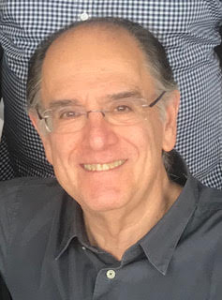The Maharajah’s Son
I met Lewis Warsh 62 years ago when we were both students at The Bronx High School of Science. He was this tall kid, impossibly thin, with a lisp out of central casting. He stooped, as though to avoid the risk of being lost in the clouds. Somehow we recognized each other, don’t ask me how. Granted we were two of the students who had let their hair grow longer than was “right.”
I had the distinction, if that is the right term, of introducing Lewis to Allegra, his first true love, and my oldest friend. Lewis and I went to different colleges. Lewis here at City, me in Chicago. We were able, easily, to sustain the friendship mostly via letters. To our great good fortune, face time, email, zoom, not to mention texting, lay nearly a half century in the future.
During the four years of college Lewis kept all the letters he received from many people, including myself. Twelve years later, in 1977, he published them as an Angel Hair book, The Maharajah’s Son.
There was no commentary on the letters; in fact, there was no introduction, no explanation as to their provenance. Just the letters. The reader could wonder whether these letters were really the product of many people writing separately from the heart or a creation of a single unidentified author.
When I first heard about the book from Allegra, whose letters were also included, I was upset. Lewis hadn’t asked anybody’s permission nor ever mentioned it to me. Years later I realized, quite suddenly, what a wonderful gift he’d given me. I had not kept any letters I received during that period (nor since), let alone made copies of my own letters before sending them off. But here were dozens of my letters and those of people talking among themselves, talking to Lewis, mentioning me, preserved intact and unchanged, treated almost as though they were holy relics of a religion of unknown origin whose rituals had been half forgotten. I saw myself for the first time in ways that I could never have managed without those letters. Lewis had returned to me parts of myself, a truly great act of friendship! I noted too, for the first time, Lewis’ inscription to me: “You are the hero of this story.”
I met Lewis when I was too young to appreciate how much he offered me and other people. I was only just taking shape myself. I could only barely see him; but I was very much drawn to what I could discern. I think I most admired (and envied) his singularity of purpose. We were talking once in our last year at Bronx Science when I asked him “What do you plan to do when you grow up?” “To write poetry” was his instantaneous response. I asked him how he knew this with such certainty. He replied with customary self-deprecation, but truth, “because there’s nothing else I can do.”
 RICHARD NEUGEBAUER is a perinatal and psychiatric epidemiologist on the medical faculty at Columbia University in New York City. His research concerns the impact of trauma and violence during pregnancy on the life course of the offspring. Presently he devotes time here and in Sub-Saharan Africa to studying the long term effects of the Rwandan Genocide (1994) on mental disorders and moral development. His wife Eda brings him great happiness combined with mystery. His two daughters have been, even before their conceptions as they well know, the lights of his life.
RICHARD NEUGEBAUER is a perinatal and psychiatric epidemiologist on the medical faculty at Columbia University in New York City. His research concerns the impact of trauma and violence during pregnancy on the life course of the offspring. Presently he devotes time here and in Sub-Saharan Africa to studying the long term effects of the Rwandan Genocide (1994) on mental disorders and moral development. His wife Eda brings him great happiness combined with mystery. His two daughters have been, even before their conceptions as they well know, the lights of his life.

